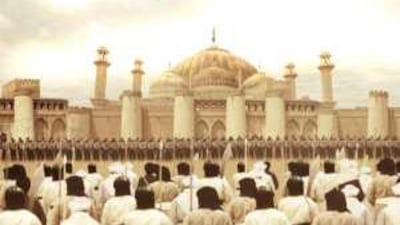KUWAIT CITY // If you ask any Kuwaiti what is the best film ever to come out of the country, chances are they will say The Cruel Sea, a love tragedy involving a pearl diver that was made in 1972 - filmmakers have produced little else of note in the 37 years since. A group of young filmmakers from the American University of Kuwait (AUK) are now trying to shake up the country's stagnant film scene with a fresh look at Arab traditions, and their trailer for The Fisherman, which is still in production, has already attracted considerable attention on the country's lively blogosphere. Bloggers have compared their offering to modern blockbusters such as 300 and Troy.
While the trailer's epic battle scenes are reminiscent of multimillion dollar films, the budget is not. Mubarak Almubarak, 24, the writer and director, said the clip was made with just 100 Kuwaiti dinars (Dh1,277) by six people in about six months. And instead of shying away from the hi-tech graphics that typify Hollywood, the group embraced them, using computer-generated imagery to create a fantasy Arabian world.
The group's "vision" includes breaking from the local media's obsession with social dramas that rarely depict the Arab world's familial relationships in a sincere and positive light. "Usually, most of the media in the West, the images they have of our families is of fathers abusing their sons. I wanted to show another side," Mr Almubarak said. "We wanted to show we have good people." Hamad Ebraheem, 26, the assistant director, said: "It's not just the western media. Even here, like in Ramadan TV series in Kuwait, the man is either a drunk, or he comes into the house and beats everybody up."
Mr Almubarak's story revolves around a fisherman who raises his son alone in an ancient Arab village. From an early age, the man instils the child with positive values until one day, when he goes on a fishing trip, an army attacks his village and enslaves his son. The fisherman enlists mercenaries to find a way to free the boy, but when he sees their leader needlessly whipping another man, he is left with a moral dilemma: should he step in to stop the cruelty, offend the mercenary and maybe not get his son back, or do nothing.
"He doesn't want to face his son and have to tell him: I didn't do what I was teaching you to do - this is his dilemma," Mr Almubarak said. The fisherman stops the punishment and is abandoned by the soldiers. After the man is abandoned, he goes from village to village, encountering different situations and helping different people along the way. News of the fisherman's quest spreads among the thankful villagers, and they form an army to attack the kingdom that pillaged his village.
It is an ambitious plot for the recent graduates and final year students in media and communications from AUK. Most of the filming took place in a public park in front of a large green screen that provided the canvas for special effects in editing. The punishing schedule involved 3am starts while fasting during Ramadan to film when the light was right. Filming took about six weeks, in which the crew recorded dozens of fight scenes in different costumes that would later be multiplied and reproduced by software to give the impression of clashing armies. Mr Almubarak's special effects created a city with pictures of mosques from Turkey and India, and old buildings from Morocco. He added details to give the impression of an ancient Arab culture.
The group also had to overcome bureaucratic challenges to independent filmmakers in Kuwait. Unlike the UAE (which now hosts two international film festivals and supports its young artists through institutions such as the Abu Dhabi Film Commission), Kuwaiti auteurs are self-taught and self-funded and struggle to get permits. The group managed to get permission to film The Fisherman only through wasta - contacts in the right places. Abdulrazzaq Jamal, 22, one of the actors, said the hurdles will not stop the group from achieving their goals.
"We are a small group in a population of a million and a half. But still, we have this ambition to spread our vision," Mr Jamal said. "People say ambition is not that good in Kuwait, and you often get turned down. OK, we were turned down: once, twice, three times, but we will never give up, that's why the name of our production team is Never Give Up Productions." As for the feedback the group has received so far, mostly on Kuwaiti film blogs, Mr Almubarak has been disappointed: "One of them said: 'You know what, I don't like this, because I like the Lord of the Rings better' - of course you will, come on, it won like 12 or 13 Oscars.
"Another one said: 'The special effects are good, but I think the special effects in 300 were a little bit better - more realistic.' We didn't have seven or eight special effects companies. I worked on it on a single computer and it's not even new," he said. The production team said a short version of the film will be finished next year. @Email:jcalderwood@thenational.ae

